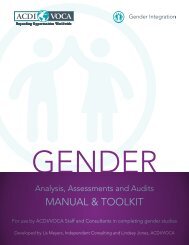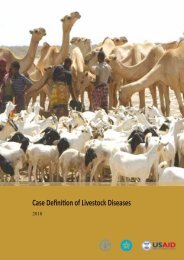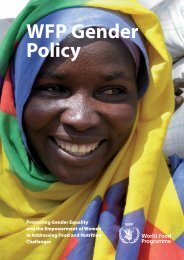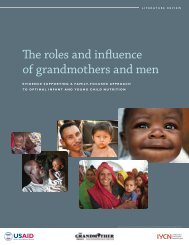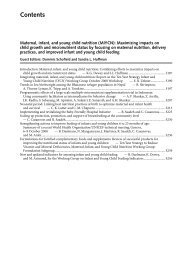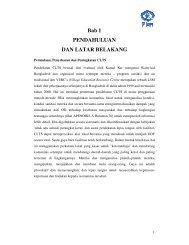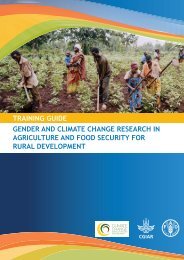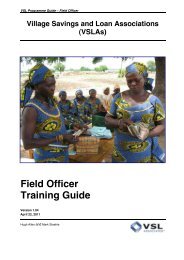Module 2. Theorethical Concepts of Gender - FSN Network Portal
Module 2. Theorethical Concepts of Gender - FSN Network Portal
Module 2. Theorethical Concepts of Gender - FSN Network Portal
Create successful ePaper yourself
Turn your PDF publications into a flip-book with our unique Google optimized e-Paper software.
Mainstreaming <strong>Gender</strong> into Water, Sanitation and Hygiene (WASH) Programs<br />
<strong>Module</strong> 2: Theoretical <strong>Concepts</strong> <strong>of</strong> <strong>Gender</strong><br />
Lesson 6: <strong>Gender</strong> <strong>Concepts</strong> (1): Sex, <strong>Gender</strong> and <strong>Gender</strong> Mainstreaming<br />
4 Initiate a discussion about ‘sex’ referring to the biologically-determined<br />
differences between men and women which cannot be changed and<br />
‘gender’ referring to the social relations between women and men,<br />
which vary in different contexts.<br />
5 Arrive at a common understanding <strong>of</strong> the meaning <strong>of</strong> the concepts <strong>of</strong><br />
sex and gender by showing the presentation on the VIPP board on the<br />
clear differences between sex and gender.<br />
6 Ask the participants to close their eyes and think <strong>of</strong> a day they might<br />
spend without women (for male participants) and without men (for<br />
female participants).<br />
7 Ask some opinions from two male and two female participants about<br />
the day they visualised.<br />
8 Come to the conclusion that both men and women cannot imagine<br />
even one day without any sort <strong>of</strong> assistance and interaction from the<br />
other, because both women and men make up the society. We need to<br />
interact with various kinds <strong>of</strong> women and men who play different roles<br />
in our lives.<br />
9 Tell the participants that we have a misconception that gender is only<br />
to do with women. This is not true. <strong>Gender</strong> is a human issue, relevant<br />
to both women and men. Refer to the previous sessions on<br />
socialisation where we found that women are disadvantaged in<br />
comparison with men throughout the world. Tell participants that that is<br />
why when we talk about gender we need to talk more about women to<br />
ensure the positive changes needed in our society.<br />
10 Show the PowerPoint presentation which clarifies why gender is a<br />
development issue, why we should not consider gender as only a<br />
women’s issue and explains how gender includes men.<br />
11 Lead a discussion which focuses on the importance <strong>of</strong> gender in<br />
development, the relevance <strong>of</strong> men’s involvement in development and<br />
the reason for gender equality strategies in the family, community,<br />
workplace and society.<br />
12 Distribute the handouts either during or at the end <strong>of</strong> the session<br />
depending on time constraints.<br />
13 Show participants the session objectives again, check that these have<br />
been achieved and ask if participants have any questions.<br />
Review<br />
1 Ask one female participant to say why men’s involvement is needed in<br />
development and one male participant to say how gender issues relate<br />
to development.<br />
2 Summarise the session by showing participants the learning outcomes<br />
and checking if participants consider that these have been achieved.<br />
A Training Manual for Water Pr<strong>of</strong>essionals developed collaboratively by PROTOS and SNV, 01/02/2007<br />
<strong>2.</strong>17



